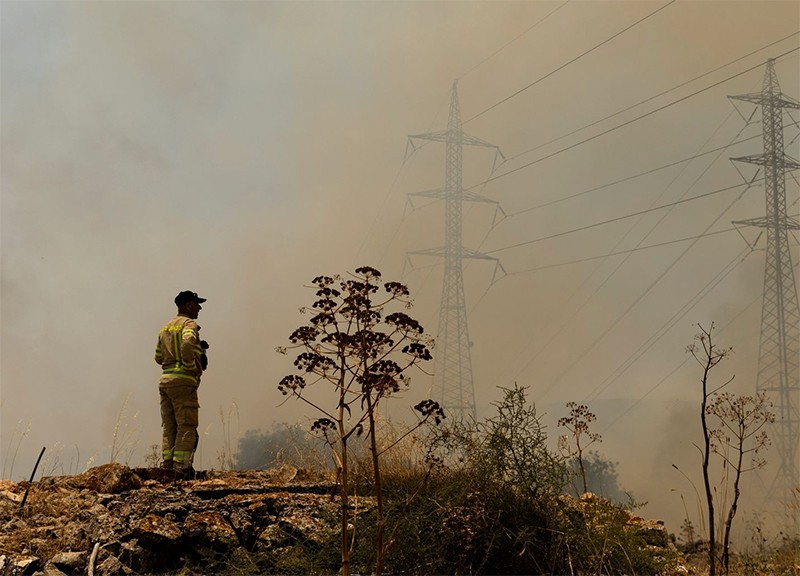
Despite efforts to keep hostilities in check, officials on both sides are sounding warnings
By Dov Lieber, Adam Chamseddine and Carrie Keller-Lynn, WSJ
Israel and Hezbollah are moving closer to a full-scale war after months of escalating hostilities with the Lebanese militant group, adding pressure on Israel’s government to secure its northern border.
Hezbollah opened a battle front with Israel on Oct. 8, the day after Hamas’s deadly raid inside Israel that sparked the war in Gaza. Hezbollah says its attacks are in support of the Palestinians, and it won’t stop until Israel halts its war in Gaza. Reluctant to open a second front, Israel initially responded to Hezbollah with tit-for-tat attacks, trying to calibrate their actions to avoid sparking a full-scale conflict.
But in recent weeks, both sides say there has been a sharp rise in hostilities. Hezbollah has increased its drone and rocket attacks, hitting important Israeli military installations. Israel, too, has stepped up attacks, targeting Hezbollah sites deep into southern Lebanon’s Bekaa Valley and senior military officials in the group.
Without a cease-fire in Gaza and subsequent deal with Hezbollah that meets Israel’s requirements, Israeli officials say an offensive is inevitable. Benny Gantz, a minister in Israel’s war cabinet, said Israel would return residents to northern Israel by Sept. 1—when schools restart—either “through a deal or through an escalation.”
Wildfires sparked by Hezbollah drone and rocket attacks raged through northern Israel beginning on Sunday. The blaze largely was contained by Tuesday morning and caused few injuries. But the images spurred demands in Israel that after eight months of low-intensity warfare with Hezbollah, which has left more than 60,000 Israelis displaced from their homes, the government needs to go on the offensive.
“They are burning here, we need to burn all of Hezbollah’s strongholds and destroy them. War!” said Israel’s far right national-security minister Itamar Ben-Gvir during a visit Tuesday to Kiryat Shmona, an Israeli city affected by the blaze, largely depopulated because of the war and under constant bombardment from Hezbollah in Lebanon.
The U.S. and France have been working on creating the outlines of a diplomatic solution, shuttling between Israel and Lebanon for months.
The talks aim to move Hezbollah’s forces more than 6 miles north of Israel, and the influx of either the Lebanese military or other international troops into the area could remove the militants, say diplomats briefed on the talks. Israel and Lebanon also would negotiate pre-existing border disputes.
Lebanese officials didn’t respond to a request for comment.
Pulling back forces would keep Hezbollah out of antitank-missile range of Israeli communities and prevent the threat that it could carry out its long-held threat to invade and conquer northern Israel. Many Israelis from northern Israel say that a cease-fire isn’t enough to bring them back to their homes.
Giora Zaltz, head of the Israeli regional district bordering with Lebanon, said the main two threats his constituents fear are a Hamas-style invasion by Hezbollah’s elite Radwan forces and shoulder-launched missiles that Israel can’t easily intercept. Alleviating their fears requires pushing Hezbollah forces and armaments several miles into Lebanese territory, which Zaltz says requires either an enforceable diplomatic solution or military action.
Without this, he said, citizens won’t return to their homes. “The border will move farther and farther south.”
Hezbollah, which also is a powerful political party in Lebanon, says it won’t agree to any diplomatic deal with Israel until the war in Gaza is halted. Despite a fresh push from President Biden for a ceasefire in Gaza, there are significant challenges left for getting there, and Israel says it will keep fighting in Gaza at some level until the end of the year.
Hassan Fadlallah, a member of Hezbollah’s parliamentary bloc, said the main message behind Hezbollah’s operations is that it is ready for a fullscale war with Israel and will fight without rules or limits.
“We have called for a cease-fire in Gaza and we don’t intend to widen the war, but if [Israeli Prime Minister Benjamin] Netanyahu decides to expand the war, it won’t be a walk in the park,” he said.














